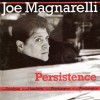There are several indispensable qualities an artist must have if he or she is to survive as a jazz musician. Tone. Technique. Ears. Resourcefulness. Adaptability. Good communication skills. Patience. Confidence. Individuality. Taste. Drive. Soul. But perhaps the most important quality a great jazz musician—or any great artist, really—must have is persistence. Lots of it. Because without it, none of the other qualities mentioned above can be attained; when we see them manifested these characteristics can seem like assets an artist has been born with, but the truth is they have to be nurtured, developed. Which takes persistence. And persistence itself is what keeps an artist’s eyes on the prize, a strength that will carry him or her through the lean times, the slings of the naysayers, the chatty, indifferent audiences, the jet lag, the bad road food, the near-empty clubs, the sleepless nights of self-doubt that all artists encounter. The ones who don’t have that all-important stick-to-itiveness eventually give up the ghost and quit playing, at least professionally.
But Joe Magnarelli has persistence. Lots of it. Joe, or Mags, as the trumpeter is often called, has been playing his horn for nearly 40 years. And for more than half of those years he’s been doing it professionally, both as a leader and in the bands of Lionel Hampton, Brother Jack McDuff, Harry Connick, Jr., Toshiko Akioshi, Jon Hendricks, and Ray Barretto, as well as in the Glenn Miller and Carnegie Hall Jazz orchestras. Joe is also a teacher, serving as an adjunct professor at the New School of Social Research in Manhattan and New Jersey City University in Jersey City and conducting clinics and master classes outside of these schools. And, having been a stellar student himself under James Moody, Tommy Turrentine, and others, Joe certainly has a lot of knowledge and experience to pass on. But in addition to the notes-and-bars music-theory material he covers, one lesson he imparts to his students is that of maintaining their resolve despite the tests and trials of learning and playing music—in other words, persistence. “Sometimes you do have to give the kids a pep talk,” Joe says. “You know, that idea of ‘Whatever doesn’t kill you makes you stronger.’” And, indeed, all tenured musicians know the value of emotional strength, both on and off the bandstand.
Since 1994 Joe has been making acclaimed albums as a leader and co-leader, but this is his first for Reservoir Music. (He played as a sideman on Gary Smulyan’s exemplary 2003 Reservoir release, The Real Deal.) “Being on Reservoir is a really good situation for me,” says Joe. “Mark Feldman has the right sensitivity as a producer. During the sessions he pretty much just let [the musicians] do our thing, but when he did offer input it was right on the mark. And I’d already known [engineer] Jim Anderson from some big band and small combo dates I’d played on, so it was all very easy, very relaxed.” It definitely comes across: One of the hallmarks of Persistence is its overall relaxed, free-flowing feel. It’s not hard to believe him when Joe mentions that the tunes were “pretty much all done in one or two takes.”
Of course, the absolutely killer band Joe put together for the session enters into the equation, too. Check this lineup, jazz fans, and just try not to salivate: Mags on trumpet, Gary Smulyan on baritone, David Hazeltine on piano, Peter Washington on bass, and Kenny “The Jazz Maniac” Washington on drums. A veritable all-star team of New York’s world-class straight-ahead scene. “They’re some amazing cats, alright,” beams Joe. “We’d all worked with each other separately before, so we were all familiar with each other. They could all sense what I wanted play, right from the first note.”
Joe wrote “Persist” during his tenure with the late conga king Ray Barretto. “The tune was originally called ‘Persist Until You Succeed’ and had lyrics written by Sue Giles (printed here), and then I just started calling it ‘Persist,” Joe explains. “But Ray didn’t like that title and renamed it ‘Mags,’ after me.” As “Mags,” the piece was done in a Latin arrangement for Barretto’s Grammy-nominated 2005 release, Time Was—Time Is. Reworked into a 4/4 swing-time adaptation, “Persist” opens this album and provides the inspiration for its title. The track kicks off with an ensemble flourish and a strong pronouncement by Kenny Washington, and features a wonderfully scrambled recurring horn vamp and colorful and blustery solos by the leader and Smulyan.
“The Village,” with its effortless, light bossa nova groove, recalls the music of Joe’s time with Barretto as well as the lively culture of Greenwich Village, where the trumpeter was living when he composed the tune. Hazeltine takes a great, sparkling turn here, staying clear of any predictable Latin keyboard clichés, and Joe contributes a fine, bubbly solo.
The band next reprises the standard “I Had the Craziest Dream,” giving the Harry Warren/Mack Gordon chestnut a smooth and buoyant but relentlessly swinging treatment. While Joe delivers the tune’s gorgeous melody with measurably heartfelt tenderness, it’s the (non-related) Washingtons that almost steal the show here. “A trumpet player hardly ever gets to play a beautiful standard with a rhythm section like that,” says Joe. “It was too much fun, playing that tune with those cats.” Peter Washington’s strutting bravado drives the performance, and the riveting breaks that he and Kenny Washington contribute are likewise highlights.
It’s not hard to guess where the title of “D Train Bugaloo” came from. “I was on the D train heading downtown to a gig at Birdland when I wrote it,” recalls Joe. “Before every record date I force myself to write one tune just for that particular session. The pressure helps me get focused for the date, and ‘D Train Bugaloo’ is the one I wrote for this album.”
Persistence also boasts a pair of ageless standards by Howard Dietz and Arthur Schwartz. Joe picked up “Haunted Heart” just a few years ago, while he was playing with Barretto. “I didn’t realize that Dietz and Schwartz had written the tune, but I’d always loved it,” Joe says. “[Barretto’s band] had done an arrangement of it, and Barretto liked what I was playing on it. He said, ‘Man, you should always play that tune.’ I love it.” And no doubt listeners will love this version, with its warm, deep Smulyan solo and the lyrical musings of the leader. “You and the Night and the Music,” on the other hand, was an unplanned inclusion. “That was the last tune we cut. We were just about to wrap the session up because [Hazeltine] had to leave to make a gig, and someone called the tune—so we did it,” Joe remembers. “There wasn’t any arrangement, we just blew.” And blow they do, especially Smulyan and Kenny Washington during an early, fiery exchange that proves one of the set’s high points.
The tellingly named ballad “Barretto” is an homage to Joe’s former mentor, who died in 2006. “I started writing it pretty soon after he passed,” says Joe. “I’d work on it every morning, adding to it little by little.” It would seem the tune’s namesake would’ve been deeply touched by the tender tribute, which is graced by the trumpeter’s gorgeous lines and Smulyan’s simpatico comping behind them, as well as a spare, exquisite passage by Hazeltine.
Joe had some fun with the title of the last tune, “Soul Sister.” “It’s basically ‘Body and Soul’ redone as a waltz,” he says. “I like to write on top of a standard once in a while. It’s fun to do.” The track’s loping, easy, pendulum-like groove offers an excellent backdrop for the lithe intervals of Peter Washington and the leader’s occasional Coltrane-esque trills. After such a satisfying ride, it’s the perfect performance to bring the album in for a smooth landing. And Mags and the band make it all sound so easy.
But of course it isn’t easy. Oh, it gets easier as the years roll on. But only after the players have already poured years of dedication and sweat into their craft. Which is a fruitful and never-ending process for Joe Magnarelli. And one jazz lovers will never tire of listening to. If there’s one lesson that this music illustrates, it’s that persistence pays off.
“Life can be very demanding, but you can’t let the tough times get you down,” offers Joe. “Every day when you wake up it’s a chance to start fresh.”
—Peter Aaron, January 2008. Peter Aaron is the music editor of Chronogram magazine and a contributor to the Village Voice, the Boston Herald, All About Jazz.com, All Music Guide.com, and Jazz Improv and Roll magazines. Copyright Reservoir Music, 2008.








